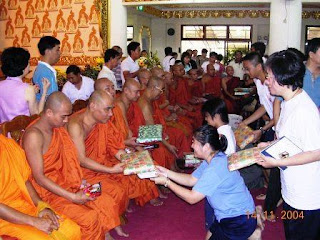Universality in Buddhism
As the Buddha’s concern is the true happiness of all beings, his teachings can be practiced in society or seclusion by all of every race and belief. It is totally unbiased and truly universal.
Purification of the Mind
Buddhism is the only religion that encourages not just the ceasing of all evil and the doing of all good – it also teaches the purification of one’s mind, which is the root of all good and evil, the cause of both suffering and true happiness.
Self Reliance
When the Buddha was meditating to gain enlightenment, no gods came to reveal any hidden secrets of spiritual power. No one gave him any religious laws to teach. He said, “I never had any teacher or divinity to teach me or tell me how to gain enlightenment. I achieved supreme wisdom by my own effort, energy, knowledge and purity.” Likewise, we can attain this highest goal through perseverance in perfecting ourselves.
Freedom of thought
From the intellectual and philosophical content of Buddhism rose the freedom of thought and inquiry unparalleled by any other established world religion or philosophy. Though the Buddha urges us to consider his teachings, there’s no obligation or compulsion whatsoever to believe or accept any Buddhist doctrine.
Education of the Truth
The Buddha is the greatest teacher of the truth (reality of all things). Buddhism is the perfect education about us and the universe we live in. It is the teaching beyond worldly knowledge – of the highest wisdom that leads to the realization of true happiness. It is interesting to note that the first university established in the world is the great Nalanda Buddhist University in India, which flourished from the second to the ninth century. It was opened to students from all over the world and was the school of many outstanding Buddhist scholars and sages.
Purification of the Mind
Buddhism is the only religion that encourages not just the ceasing of all evil and the doing of all good – it also teaches the purification of one’s mind, which is the root of all good and evil, the cause of both suffering and true happiness.
Self Reliance
When the Buddha was meditating to gain enlightenment, no gods came to reveal any hidden secrets of spiritual power. No one gave him any religious laws to teach. He said, “I never had any teacher or divinity to teach me or tell me how to gain enlightenment. I achieved supreme wisdom by my own effort, energy, knowledge and purity.” Likewise, we can attain this highest goal through perseverance in perfecting ourselves.
Freedom of thought
From the intellectual and philosophical content of Buddhism rose the freedom of thought and inquiry unparalleled by any other established world religion or philosophy. Though the Buddha urges us to consider his teachings, there’s no obligation or compulsion whatsoever to believe or accept any Buddhist doctrine.
Education of the Truth
The Buddha is the greatest teacher of the truth (reality of all things). Buddhism is the perfect education about us and the universe we live in. It is the teaching beyond worldly knowledge – of the highest wisdom that leads to the realization of true happiness. It is interesting to note that the first university established in the world is the great Nalanda Buddhist University in India, which flourished from the second to the ninth century. It was opened to students from all over the world and was the school of many outstanding Buddhist scholars and sages.



Comments